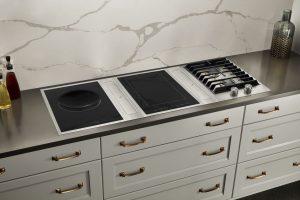Only the Inside of My Refrigerator Needs Cleaning
While it is important to keep the interior compartment of your refrigerator clean and hygienic, it is also vital to clean the outside. Neglecting cleaning the refrigerator exterior, particularly the condenser coils, can actually compromise the lifespan of your appliance. Cleaning the coils is a relatively simple and quick maintenance task that should be performed once or twice each year, which can boost efficiency and help prevent your refrigerator overheating.
Newer refrigerator models tend to have condenser coils at the bottom of the appliance, rather than the back on older refrigerators. While this can make it a little tougher to access for cleaning, you’ll find specific instructions in your owner’s manual.
It’s Fine to Leave My Dishwasher if I’m on a Long Trip
If you’re leaving your home for an extended break, particularly in winter, it is essential to ensure that your dishwasher is switched off and disconnected. If your dishwasher won’t be used for several weeks or more and may be exposed to below freezing temperatures, the hoses could freeze or dry out. You can prevent this by turning off the power to the appliance by tripping the circuit breaker or removing the fuses. You should also shut off the water supply and place a pan under your inlet valve. It is essential to disconnect the water line and drain it into the pan and disconnect your drain line and drain it into the pan. When you return home, you’ll need to reconnect the drain, water, and electricity supply and run your dishwasher on a heavy soil cycle to ensure the appliance is operating correctly. While you may feel confident tackling this preparation, it is a good idea to err on the side of caution and have a professional technician perform these tasks to avoid damage.
You Only Need the Self Clean to Clean an Oven
While a self-cleaning feature is a great tool to clean your oven compartment, you will also need to clean your vent filter. Vent filters should be cleaned regularly and replaced annually for optimal maintenance. Cleaning your vent hood filter will also help avoid grease building up around your range and cooktop. Bear in mind that you should clean any large spills before running a self-clean cycle to get a sparkling finish.
You Can Use Oven Cleaner on Cooktops
While it may seem like you need to have cleaning products for every area of your home, it is vital that you not use oven cleaner on your cooktop. Oven cleaners contain very harsh chemicals that can cause damage to a cooktop, particularly glass models. You should avoid using abrasive cleaners, chlorine bleach, ammonia or scouring pads on your glass cooktop as these items can cause damage and scratches to the surface. Instead, remove any large spills with a soft cloth and apply a cooktop cleaner. Allow the product to stand for several minutes and scrub with a non-abrasive cloth or pad. Remove any excess cleaner with a soft, clean cloth. Remember that it is easier to clean spills before they dry and bake on to the surface, so try to wipe up any messes as quickly as possible.
There are a number of options for maintaining your kitchen appliances and educating yourself will help you obtain maximum functionality and performance. For practical guidance and advice, you can rely on a professional home appliance repair technician.
For help with all of your appliance maintenance and repair issues, be sure to speak to a professional appliance repair service.
